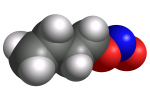Butyl nitrite
 | |
 | |
| Clinical data | |
|---|---|
| ATC code |
|
| Legal status | |
| Legal status |
|
| Identifiers | |
| |
| CAS Number | |
| PubChem CID | |
| ChemSpider | |
| UNII | |
| CompTox Dashboard (EPA) | |
| ECHA InfoCard | 100.008.057 |
| Chemical and physical data | |
| Formula | C4H9NO2 |
| Molar mass | 103.121 g·mol−1 |
| 3D model (JSmol) | |
| Boiling point | 78.0 °C (172.4 °F) |
| |
| |
| (verify) | |
Butyl nitrite is the organic compound with the formula CH3(CH2)3ONO. It is an alkyl nitrite made from n-butanol. Butyl nitrite is used recreationally as poppers. Synonyms include 1-butyl nitrite, n-butyl nitrite and nitrous acid butyl ester.
It can be prepared by treating nitrous acid (generated in situ) with n-butanol.[2]
Applications
Butyl nitrite is one of the compounds used as poppers, inhalant drugs that induce brief euphoria. It was developed by Clifford Hassing,[3][4] a graduate student in Los Angeles, as a faster-acting analog of alkyl nitrite. Among the inhalants' trade names are Rush, Locker Room, and Bolt. They are sometimes marketed as "Cleaner", liquid incense, or room odorizer. It is used for its euphoric effect and for relaxing the smooth muscles during sexual intercourse.[3][4]
Butyl nitrite is an important reagent in the synthesis of both organic and inorganic compounds and in the production of various other nitrites.[5] It is often used as a nitrosating agent, particularly for the production of nitrosamines.[6]
See also
References
- ^ Therapeutic Goods (Poisons Standard—October 2024) Instrument 2024 (Cth)
- ^ Noyes WA (1936). "N-Butyl Nitrite". Organic Syntheses. 16: 7. doi:10.15227/orgsyn.016.0007.
- ^ a b Orlean SC (5 February 1980). "Doctors Say It Can Kill You, but Butyl Nitrite Is a Legal High in Portland". Willamette Week. Retrieved 5 June 2022.
- ^ a b Mack D (27 July 2021). "This Man Does Not Make Poppers". BuzzFeed News. Retrieved 5 June 2022.
- ^ Santa Cruz Biotechnology: Butyl nitrite | CAS 544-16-1 | SCBT - Santa Cruz Biotechnology, retrieved on 19 October 2024.
- ^ Nigel S. Simpkins (2001), "n -Butyl Nitrite", Encyclopedia of Reagents for Organic Synthesis, Chichester, UK: John Wiley & Sons, Ltd, doi:10.1002/047084289x.rb404, ISBN 978-0-471-93623-7
